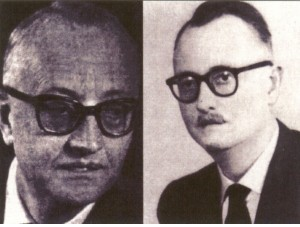Difference between revisions of "Herbert Gross"
m (add image) |
(unstub) |
||
| Line 1: | Line 1: | ||
{{person | {{person | ||
| − | |description=Attended the 3rd and 4th Bilderbergs | + | |description=One of the first to fundamentally deal with [[public relations]] on a programmatic level in post-war [[West Germany]]. Attended the 3rd and 4th Bilderbergs |
|amazon= | |amazon= | ||
|website=https://pr-museum.de/personen/pr-praktiker-forscher/herbert-gross/ | |website=https://pr-museum.de/personen/pr-praktiker-forscher/herbert-gross/ | ||
| Line 6: | Line 6: | ||
|image_caption=Gross in 1967 (left) and 1957 (right) | |image_caption=Gross in 1967 (left) and 1957 (right) | ||
|nationality=German | |nationality=German | ||
| − | |birth_date= | + | |birth_date=1907 |
|birth_place= | |birth_place= | ||
| − | |death_date= | + | |death_date=1976 |
|death_place= | |death_place= | ||
| − | |constitutes= | + | |constitutes=propagandist |
}} | }} | ||
| − | '''Herbert Gross''' attended the [[1955 September Bilderberg|1955 September]] and [[1956 Bilderberg]]. | + | '''Herbert Gross''' was a German economist and PR-expert who attended the [[1955 September Bilderberg|1955 September]] and [[1956 Bilderberg]]. |
| + | |||
| + | With his [[1951]] publication ''Moderne Meinungspflege'' (Modern Opinion Management) was one of the first to fundamentally deal with public relations on a programmatic level in Germany after the [[Second World War]]. At the same time, he gave instructions for business practice, including partnerships between management and [[unions]].<ref name=pr-museum>https://pr-museum.de/personen/pr-praktiker-forscher/herbert-gross/#id2</ref><ref>http://library.mpib-berlin.mpg.de/toc/z2010_1173.pdf</ref> | ||
| + | |||
| + | ==Ideas== | ||
| + | Gross can be characterized as an expert in [[economics]]. PR was just one topic among many for him.<ref name=pr-museum/> | ||
| + | |||
| + | Gross was impressed by the stability of [[US]] society and the loyalty of its population to entrepreneurship across social classes. He saw an important reason for this in many years of successful [[public relations]]. Gross developed his ideal of communication by orienting himself to the American understanding of public relations - albeit in a supposed original or pure form and not as a fashionable "varnish". He was critical of European-German traditions of conflicting interests and in particular of the role of the (social)state and corporative structures. However, he emphasized that American conditions could not be transferred 1:1 to post-war [[West Germany]].<ref name=pr-museum/> | ||
| + | |||
| + | Gross himself saw the economic and social model of the USA as a model for the new West Germany after the Second World War. His positioning between a [[market liberal]] economy and [[social market economy]] remained vague. | ||
| + | |||
| + | {{QB|[[The West|The Occident]] took a dangerous path when it left the social to non-entrepreneurial authorities. In the course of its transformation into a [[welfare state]], the state has significantly weakened the ability of the corporate economy to identify all interests with their ability to function. The company is the cell of performance and thus also bears the social expenses, just as the farm bears the cost of supporting its old.<ref>https://pr-museum.de/personen/pr-praktiker-forscher/herbert-gross/politischer-kontext-des-buches-moderne-meinungspflege/</ref>}} | ||
| + | |||
| + | |||
{{SMWDocs}} | {{SMWDocs}} | ||
==References== | ==References== | ||
{{reflist}} | {{reflist}} | ||
| − | |||
Revision as of 14:15, 19 July 2022
(propagandist) | |
|---|---|
 Gross in 1967 (left) and 1957 (right) | |
| Born | 1907 |
| Died | 1976 (Age 69) |
| Nationality | German |
One of the first to fundamentally deal with public relations on a programmatic level in post-war West Germany. Attended the 3rd and 4th Bilderbergs | |
Herbert Gross was a German economist and PR-expert who attended the 1955 September and 1956 Bilderberg.
With his 1951 publication Moderne Meinungspflege (Modern Opinion Management) was one of the first to fundamentally deal with public relations on a programmatic level in Germany after the Second World War. At the same time, he gave instructions for business practice, including partnerships between management and unions.[1][2]
Ideas
Gross can be characterized as an expert in economics. PR was just one topic among many for him.[1]
Gross was impressed by the stability of US society and the loyalty of its population to entrepreneurship across social classes. He saw an important reason for this in many years of successful public relations. Gross developed his ideal of communication by orienting himself to the American understanding of public relations - albeit in a supposed original or pure form and not as a fashionable "varnish". He was critical of European-German traditions of conflicting interests and in particular of the role of the (social)state and corporative structures. However, he emphasized that American conditions could not be transferred 1:1 to post-war West Germany.[1]
Gross himself saw the economic and social model of the USA as a model for the new West Germany after the Second World War. His positioning between a market liberal economy and social market economy remained vague.
The Occident took a dangerous path when it left the social to non-entrepreneurial authorities. In the course of its transformation into a welfare state, the state has significantly weakened the ability of the corporate economy to identify all interests with their ability to function. The company is the cell of performance and thus also bears the social expenses, just as the farm bears the cost of supporting its old.[3]
Events Participated in
| Event | Start | End | Location(s) | Description |
|---|---|---|---|---|
| Bilderberg/1955 September | 23 September 1955 | 25 September 1955 | Germany Bavaria Garmisch-Partenkirchen | The third Bilderberg, in West Germany. The subject of a report by Der Spiegel which inspired a heavy blackout of subsequent meetings. |
| Bilderberg/1956 | 11 May 1956 | 13 May 1956 | Denmark Fredensborg | The 4th Bilderberg meeting, with 147 guests, in contrast to the generally smaller meetings of the 1950s. Has two Bilderberg meetings in the years before and after |